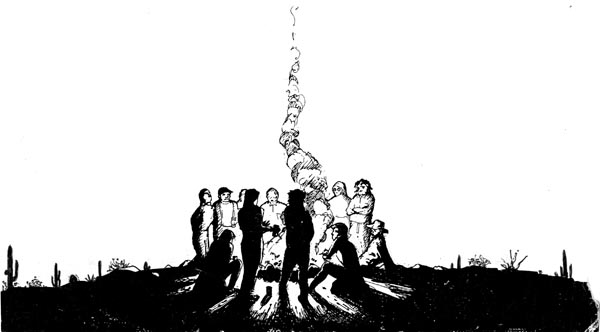|
|||||||||||||
|
How Anarchy Can Produce Social Harmony By Punkerslut
The Individual's Relationship to Society is Mutual and Voluntary
Cooperation is defined by the right of non-cooperation. When we say that people "cooperate," we mean that they come together and work together, on a basis decided by the participants. When we work together under the command of one individual, then it is on a basis decided by an authority. The basis of cooperation, then is that it is voluntary. Cooperating means choosing to work together, and never losing the right to refuse working together. Cooperation itself is a method of social organizing that allows each to work together or not work together, as each decides -- or, in political language, it is Anarchy. The political philosophy that encourages working together voluntarily is titled Anarchism. Those who want to defend government and the state, however, often use the word "anarchy" to describe any place where petty tyranny reigns. The word "cooperate," though, is used positively, which comes with a smile and a mild uplifting of your heart. What would happen to society if every relationship was based on the principle of cooperation? What would happen if every institution, from education to civil defense to scientific investigation, were organized according to cooperation, and not authority? In that case, we would have a purely Anarchist society, as there would no longer be any authority. Few are willing to follow the principle of voluntary participation to its end. That would mean that government is arbitrary, and could have no other use than the abuse of its authority. Everything that the government claims to have done is actually accomplished by the people, where it is positive. Those who die in wars defending a nation are filled up by the ranks of citizens, not governors. It is the same as those who die in wars trying to conquer another nation, not for themselves, but for their governors. This is the tragedy of government and authority altogether: it claims for itself everything that the people themselves achieve, and then it attempts to misdirect the public energy towards its own self-interested ends of power. Why is a Free and Mutual Society Better?
If society is based on cooperation, that means that every individual or association of individuals is free -- they can enter into whatever agreements they want to with each other. Why is freedom better? Liberty is better, because it means you have choice. And when you can choose, those you are choosing from are aware of this; they must consider the fact that you exchange with them only because you want to, and therefore, they'll only offer you exchanges that are good for you. Consider an association of farmers, who come together so that they can sell their produce together and share the profits. What if some of the farmers demanded a higher share of the profits than others, even if they contributed just the same? Then the other laborers would have an obligation to quit the association and form a new one. And this obligation is simply one of self-interest -- it is very far from reaching out to the ideal of the perfectly altruistic person. Cooperation, then, produces a society that best fits the natural tendencies among humanity, at least toward self-interest. Monarchy, with its absolute courts and its unchallengeable rulers, imagines that humanity can be perfected, or at least some part of it. Republics, with their powerful media and vicious police, imagines that the people can be enthralled with patriotism, or at least enough of them to repress the others. The cooperative society, however, imagines there to be justice and harmony, not from some abstract principle, but simply by mutually working together and regarding our own self-interest. Just as the organization must offer its participants a fair deal, so, too, must the participants hold up their obligations to the group. Every organization that comes into existence does so because those making it up want to accomplish some shared aim. If someone doesn't fulfill their end of the agreement, then the group holds the right to expel that individual. Whether they're cooperating with each other as workers or consumers, as members of a neighborhood or contributors of a school, every organization has the right to exclude anyone. The right to reject any organization guarantees good behavior on the part of the organization; the right to reject any individual, likewise, provides a similar incentive toward the participant. How is the Social Organization Effected by Cooperation?
If a group in society must rely on the voluntary cooperation of people, then it will need to orient itself toward their interests. It may be an educational effort, where a community comes together to provide culture and thought to their developing youth. It may be as local and as simple as a neighborhood association, for protection against crime and providing assistance to those in need. Or, it may be as wide and as complicated as a scientific association of botanists and biologists, discussing experiment results over the distance of thousands of miles. The most common attribute of humanity is the impulse to act upon the world; just as we get more from society as a whole than on our own, we also form or join groups in to advance our interests in one particular way or another. Any and every type of group will be formed, from professional associations of librarians to networks of hospitals and medical caregivers. The uniqueness of our individualism shows through only when we work together with others, whether the end is artistic or educational, social or economic. But every association needs the contributions of effort and material from its members. No library could exist without someone to erect its walls and to maintain the media available to visitors. No hospital could continue without a regular supply of medicines and equipment. A school, even if it were out in the wilderness, would be quite sad if it had no books; and a public restaurant, that gave food to all, could be glorious even in the outdoors, unless it had no food. And finally, every one of these materials must be handled or worked upon by a laborer, whether teacher or scientist. That means constant and regular wages that can guarantee a standard of living for those talented enough to hold these positions. If the individual joins an association of schools, they may be taught, or their child may be taught, from their contributions. And if an individual contributes to other social efforts, from healthcare to industry, then they will naturally have a right to some social product resulting from it. However, organizations can only demand participants who are voluntary. The organizations that do not waste their resources will attract the most, as those that do waste their resources will attract few; by the simple principles of self-interest, society acts in a way to gently reduce those groups that have no social use, and to enthusiastically encourage those that genuinely reach the needs of the people.
How is the Individual Effected by Cooperation?
The principles of cooperation between an individual and a group are just like those between two individuals. The group itself has the right to voluntarily end its association with the individual. Consider the position of the association formed for education, healthcare, defense, or any other end. Imagine that there is someone who takes from the efforts of others, and does not contribute. Isn't it in the interest of every other member to eject this participant? After all, every individual in the association has the right to end interaction with anyone they want, as an individual; why should they suddenly lose this right when they have joined together to form a group? Since individuals join organizations only voluntarily, this causes the associations to offer fair terms, otherwise, the individual will just join another group. Likewise, since organizations can accept and expel any individual they like, this provides incentive to the individual. The single person becomes aware that they have obligations for what they receive, based on the single fact that they will no longer receive it, if they do not fulfill their obligations. It is through the most simple principle of self-interest that the organization encourages participation and social activity. The organization does not ask the individual to live up to some eternal principle of morality and self-sacrifice for the greater good; the organization only asks for the individual to regard their own self-interest, the most common and basic attribute found throughout humanity. Those systems which have demanded infallible virtue, in their presidents and kings, seems to be based on the principle that virtue is universally everywhere and the greatest of man's quantities, thus, we are allowed to impose cruel, powerful laws on beings who ought to be perfect angels. This also miraculously solved the problem of how to answer those who asked about corrupt presidents and kings. The organization only demands of the individual that they contribute as much as is required of them to the whole production. An individual is but one single part, whereas a whole society is the multiplication of its part. A single family, if it were to provide its own education, food, clothing, and housing, without interacting with anyone else, would be living a miserable existence. By working together, by specialization of work and application of technology to industry, humanity can work much less and gain much more. It is in the self-interest of the individual to find, join, or create mutual associations. The satisfaction of self-interest, and the ability to withdraw this, is what guarantees the individual's cooperation with the group. A Mutual, Reciprocal Society Based on Cooperation
It is likely that organizations would network and federate together. A person who is in debt to one system of education would be known immediately to all other systems of education. Organizations would work with each other on a basis just as individuals. Hospitals would federate with hospitals, restaurants with restaurants, mines with mines, and factories with factories. And in their whole combination, to guarantee good communication between society's parts, there would also be various industrial congresses, each established for whatever region, and some of them overlapping. People working together across borders in anarchy is called cooperation; in the government, it is called illegal immigration. Virtue is a thousand times more common than self-interest; and those who believed this have created the worst police states, responsible for murdering hundreds of millions, and enslaving entire peoples. Anarchism, or pure cooperation, does not imagine some perfect teaching or morality that shall turn people into the selfless martyrs that will create a utopia on the planet. Anarchism applies the most practical, useful method of organization that is fit toward the nature and character of humanity. It is not that Anarchism encourages self-interest, but since it relies on the self-interest of the individual, there will not be one single person who can be excluded from the Anarchist society. The only person who might be rejected is the person is not interested in whatever happens to themselves -- and at such a point, there is no society that could help them. Anarchism demands voluntary relationships. To the organizations built up by the people, it says, "Anyone can join or leave you as they wish, so be aware that you are fair and just with everyone you cooperate with. Even if you were to use a loophole in an agreement to deceive them, you would lose their confidence, and lose their participation, which cannot be bound by any agreement." And to the individual, it says, "Any group can expel you from their midsts as they like, so be fair and just with those you make agreements with. To cheat a group of people is only to cheat each participant of that group by so much, and they have a right to have something against you for cheating them as a collective."
Punkerslut,
|




